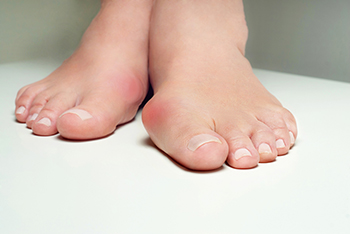Symptoms and Causes of Bunions
Tuesday, 02 July 2024 00:00
Bunions are bony bumps that form at the base of the big toe, causing it to deviate toward the other toes. This misalignment can lead to pain, swelling, and redness surrounding the joint. Symptoms often include a pronounced bump on the side of the foot, discomfort while walking, and restricted movement of the big toe. Bunions are typically caused by inherited foot structure abnormalities, but they can also result from or made worse by wearing tight or ill-fitting shoes that compress the toes. High heels and narrow-toed shoes are common culprits. Other contributing factors include arthritis and prolonged pressure on the feet. Early intervention with proper footwear, orthotic devices, and, in severe cases, surgery can alleviate symptoms and prevent further progression. A bunion can be painful and unsightly. If you have developed this foot condition, it is suggested that you visit a podiatrist who can offer you appropriate relief treatment methods.
If you are suffering from bunions, contact Steven Spivak, DPM of Mount Holly Family Footcare. Our doctor can provide the care you need to keep you pain-free and on your feet.
What Is a Bunion?
A bunion is formed of swollen tissue or an enlargement of boney growth, usually located at the base joint of the toe that connects to the foot. The swelling occurs due to the bones in the big toe shifting inward, which impacts the other toes of the foot. This causes the area around the base of the big toe to become inflamed and painful.
Why Do Bunions Form?
Genetics – Susceptibility to bunions are often hereditary
Stress on the feet – Poorly fitted and uncomfortable footwear that places stress on feet, such as heels, can worsen existing bunions
How Are Bunions Diagnosed?
Doctors often perform two tests – blood tests and x-rays – when trying to diagnose bunions, especially in the early stages of development. Blood tests help determine if the foot pain is being caused by something else, such as arthritis, while x-rays provide a clear picture of your bone structure to your doctor.
How Are Bunions Treated?
- Refrain from wearing heels or similar shoes that cause discomfort
- Select wider shoes that can provide more comfort and reduce pain
- Anti-inflammatory and pain management drugs
- Orthotics or foot inserts
- Surgery
If you have any questions, please feel free to contact our office located in Lumberton, NJ . We offer the newest diagnostic and treatment technologies for all your foot care needs.




